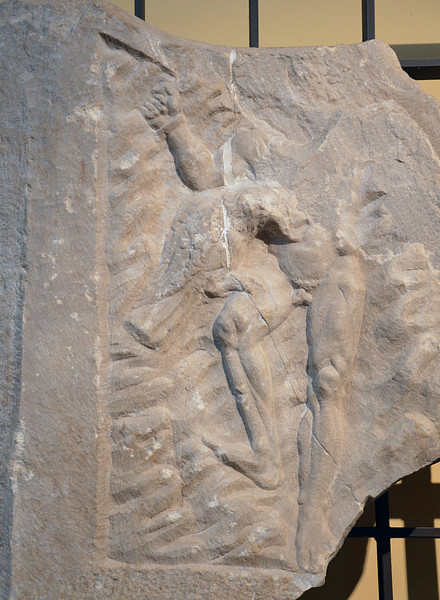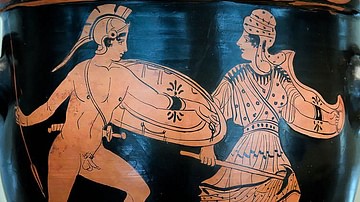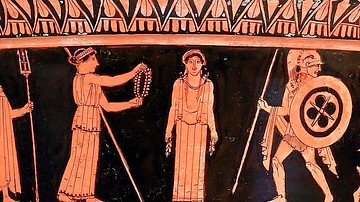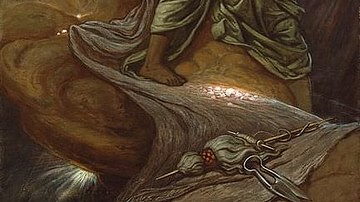
In Greek mythology, the Titan Prometheus had a reputation as being something of a clever trickster and he famously gave the human race the gift of fire and the skill of metalwork, an action for which he was punished by Zeus, who ensured everyday that an eagle ate the liver of the Titan as he was helplessly chained to a rock.
Prometheus (meaning "Forethought") was one of the ringleaders of the battle between the Titans and the Olympian gods led by Zeus to gain control of the heavens, a struggle which was said to have lasted ten years. Prometheus did, however, switch sides and support the victorious Olympians when the Titans would not follow his advice to use trickery in the battle.
According to Hesiod's Theogony, Prometheus' father was Iapetus, his mother was Clymene (or Themis in other versions) and his brothers were fellow Titans Epimetheus (Afterthought or Hindsight), Menoetius, and Atlas. One of Prometheus' sons was Deucalion, an equivalent of Noah, who survived a great flood by sailing in a great chest for nine days and nights and who, with his wife Pyrrha, became the founder of the human race.
In some traditions of the creation of humanity, Prometheus made the first man from clay, whilst in others, the gods made all creatures on Earth, and Epimetheus and Prometheus were given the task of endowing them with gifts so that they might survive and prosper. Epimetheus liberally spread around such gifts as fur and wings but by the time he got around to man, he had run out of gifts.
Prometheus' Crime
Feeling sorry for man's weak and naked state, Prometheus raided the workshop of Hephaistos and Athena on Mt. Olympus and stole fire, and by hiding it in a hollow fennel-stalk, he gave the valuable gift to man which would help him in life's struggle. The Titan also taught man how to use their gift and so the skill of metalwork began; he also came to be associated with science and culture.
In a slightly different version of the story, mankind already had fire, and when Prometheus tried to trick Zeus into eating bones and fat instead of the best meat during a meal at Mt. Olympus, Zeus, in anger, took away fire so that man would have to eat his meat raw. Prometheus then stole the fire as in the alternative version. This also explained why, in animal sacrifices, the Greeks always dedicated the bones and fat to the gods and ate the meat themselves.
The Punishment of Prometheus
Zeus was outraged by Prometheus' theft of fire and so gave the Titan an eternal punishment by having him taken far to the east, perhaps the Caucasus. Here Prometheus was chained to a rock (or pillar) and Zeus sent an eagle to eat the Titan's immortal liver. Even worse, the liver re-grew every night and the eagle returned each day to perpetually torment Prometheus. Fortunately for man's benefactor, but only after many years, the hero Hercules, when passing one day during his celebrated labours, killed the eagle with one of his arrows. In the Greek poet Hesiod's Works & Days we are told that Zeus punished man for receiving the fire by instructing Hephaistos to create the first woman, Pandora, from clay and through her all the negative aspects of life would befall the human race - toil, illness, war, and death - and definitively separate mankind from the gods.
Prometheus was worshipped in Athens, particularly by potters (who, of course, needed fire in their kilns) and there was an annual torch race held in the god's honour. Prometheus first appears in Greek art in a 7th century BCE ivory from Sparta and on Greek pottery from c. 600 BCE, usually being punished. The myth of Prometheus and his terrible punishment by Zeus was the theme of tragic poet Aeschylus' Prometheus Bound.











